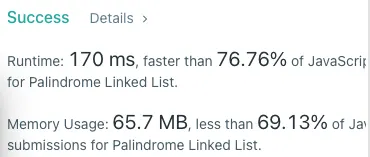연결 리스트가 팰린드롬 구조인지 판별하라
My solution
leetCode는 입력으로 링크드리스트의 head만 넘겨주는 방식으로 입력을 준다.
jest로 테스트를 돌리면서 문제를 풀고 있어서 이 형식에 맞는 입력을 만들기 위해서 아래처럼 세팅했다. 이후linkedList.js 파일을 만들어 정의와 프로토타입 메서드는 분리해뒀다.
function ListNode(val, next) {
this.val = val === undefined ? 0 : val;
this.next = next === undefined ? null : next;
}
function LinkedList() {
this.head = null;
this.length = 0;
}
LinkedList.prototype.size = function () {
return this.length;
};
LinkedList.prototype.isEmpty = function () {
return this.length === 0;
};
LinkedList.prototype.printNode = function () {
let out = '';
for (let node = this.head; node != null; node = node.next) {
out += `${node.val} -> `;
}
console.log(`${out} null`);
};
LinkedList.prototype.append = function (value) {
const node = new ListNode(value);
let current = this.head;
if (this.head === null) {
this.head = node;
} else {
while (current.next != null) {
current = current.next;
}
current.next = node;
}
this.length++;
};
// TC1
const ll = new LinkedList();
ll.append(1);
ll.append(2);
ll.append(2);
ll.append(1);
// TC2
const ll2 = new LinkedList();
ll2.append(1);
ll2.append(2);
test('TC1', () => {
expect(palindromeLinkedList(ll.head)).toStrictEqual(true);
});
test('TC2', () => {
expect(palindromeLinkedList(ll2.head)).toStrictEqual(false);
});
JavaScript
복사
Code
const palindromeLinkedList = function (head) {
let prev = null;
let tHead = head;
const arr = [];
// tHead를 바꾸면서 배열화
while (tHead) {
arr.push(tHead.val);
// 현재 tHead.next로 노드 거꾸로 연결하고 prev는 tHead를 저장하면 tHead를 다음 노드로 변경
[tHead.next, prev, tHead] = [prev, tHead, tHead.next];
}
// 정방향 배열과 역방향 연결 리스트를 비교
return arr.every(value => {
// 맨 뒤 노드를 가지고 있는 prev를 이용해서 값을 비교
const i = prev.val === value ? 1 : 0;
prev = prev.next;
return i;
});
};
JavaScript
복사
Solution
1. 리스트 변환
파이썬의 리스트는 pop에 인덱스를 줄 수 있다. 연결리스트를 리스트로 변환한다.
pop(0)을 하기 때문에 모든 값이 한 칸씩 시프팅되어 시간복잡도 O(n)이 발생한다.
2. 데크를 이용한 최적화
데크는 양방향 모두 O(1)에 가능하다.
이 방식이 가독성은 훨씬 좋은데 속도가 매우 느리게 나온다. js에서는 데크를 따로 구현해야해서 배열로 했는데 시프팅이 있기 때문으로 보인다. 데크를 구현한다음 q를 수정해 적용해볼 수 있을듯 하다.
const palindromeLinkedList = function (head) {
if (head === null) return true;
const q = [];
let node = head;
while (node !== null) {
q.push(node.val);
node = node.next;
}
while (q.length > 1) {
if (q.shift() !== q.pop()) return false;
}
return true;
};
JavaScript
복사
3. Go로 데크 구현
데크 자료형을 지원하지 않아 100줄 이상의 코드 구현이 필요해진다.
4. 런너를 이용한 우아한 풀이
제대로 된 풀이법이다.
속도도 약간 더 빨랐다.
const palindromeLinkedList = function (head) {
let rev = null;
let slow = head;
let fast = head;
// fast가 끝에 도달하면 slow는 가운데 노드
while (fast && fast.next) {
fast = fast.next.next;
[rev, rev.next, slow] = [slow, rev, slow.next];
}
// 입력이 홀수개면 slow가 한 칸 더 이동해야 중앙을 넘긴다.
if (fast) slow = slow.next;
// 이후 slow가 가리키는 곳부터 만들어둔 rev(역순 연결리스트)를 차례대로 비교해나간다.
// rev 초기값이 null이었으므로 팰린드롬일 때 마지막 rev.next는 null이 되어 최종 rev는 null이다.
while (rev && rev.val === slow.val) {
[slow, rev] = [slow.next, rev.next];
}
return !rev;
};
JavaScript
복사
.png&blockId=5f7573ad-6867-4d59-999e-722aced04aeb)


